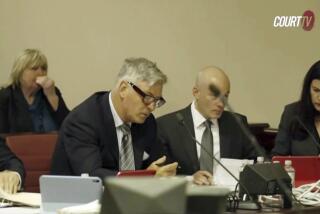Jury Pool Quizzed for Broderick Trial
- Share via
Jury selection officially began Friday in Elisabeth Anne (Betty) Broderick’s double murder trial, as 117 potential jurors were asked to describe in three lines or less what circumstances might justify one person killing another.
A 34-page, 150-question questionnaire--an attempt to learn as much about the jury pool as possible--also inquired about several other topics related to the case, such as whether jurors are divorced, object to vulgar language and believe lawyers are honest.
It even delved into more sensitive material--for instance, inquiring whether jurors “have strong feelings about abortion.”
The distribution of the lengthy forms signaled the official start of what San Diego Superior Court Judge Thomas Whelan announced was likely to be a 7-week trial. Over the next three weeks, hundreds more jurors are due to fill out the questionnaires--and then undergo individual questioning--before the two sides of the case are presented.
Broderick, 42, faces two counts of murder in the shooting deaths last Nov. 5 of her ex-husband, Daniel T. Broderick III, and his new wife, Linda Kolkena Broderick. They were shot as they slept in their Marston Hills home.
Daniel Broderick was a prominent medical malpractice attorney and a former county bar president.
During and after a bitter divorce, Betty accused Daniel of using his legal influence to cheat her out of her fair share of his seven-figure income.
Broderick confessed to the killings in a March interview in The Times. She said they were a “desperate act of self-defense” against a man who wanted to control her.
Broderick, who pleaded not guilty, has been held without bail at the Las Colinas women’s jail in Santee since last November.
Before the questionnaires were passed out Friday, the jury pool was screened for people with financial hardships, medical disabilities or paid-for vacations in October or November, Whelan said. Anyone in those categories and students were excused, he said.
Of the 120 people who remained, three more were excused for work-related conflicts, including Linda Miller, a spokeswoman for the district attorney’s office, who works with lead prosecutor Kerry Wells.
The 117 who were left were given the questionnaire. Wells and defense lawyer Jack Earley prepared the form and while Whelan approved the questions, he did not write any of them.
Because of the wealth of information the forms provide, they have become increasingly popular in complex cases. They also relieve the lawyers and judge in a case from the bother of asking each juror individually, in open court, the questions on the form--in this case, 150 of them.
Earlier this month, a state appellate court in San Diego ruled in an unrelated case that jury questionnaires are part of the public record. Even though the forms may ask sensitive questions, the federal Constitution demands that the process of picking a jury be done in public, the 4th District Court of Appeal ruled.
The Broderick case is the first high-profile trial to follow that rule. Whelan made the blank questionnaires available late Friday, after the 117 potential jurors had gone for the day.
Of the 150 questions, 11 were devoted to divorce. One asked, “How did you feel you were treated by the legal system during your divorce proceedings?”
Betty Broderick contends Daniel Broderick manipulated the system to his benefit in their divorce.
The questionnaire does not indicate which side wrote which question. It is not clear, for instance, whether prosecutor Wells or defense attorney Earley asked the questions about vulgar language or abortion.
After her first two children were born and before she bore two others, Betty Broderick had an abortion.
According to court papers, Betty left vulgar messages about Linda on Daniel’s answering machine.
The questionnaire also asks, “Do you feel different about a woman’s use of vulgar language than a man’s?”
It inquires whether jurors identify with “any ancestral or national heritage (such as French, English or Irish).” Daniel Broderick was Irish.
It asks, “Whether you know any lawyers personally or not, what is your general opinion of lawyers?”
It asks what opinions jurors have about the usefulness of testimony by psychiatrists or psychologists at criminal trials. In pretrial rulings, Whelan said Betty Broderick would be allowed to testify about anything related to her mental state before and after the killings.
It asks, “How would you respond if you discovered your spouse or boyfriend (or) girlfriend was having an affair with someone else?” It says, “Describe the situation in your life where you feel you were treated the most unfairly.”
And it asks jurors to rank, on a scale, the honesty level of the following: state legislators, criminal defense attorneys, prosecutors, police departments, police officers, newspaper reporters, civil lawyers and judges.
On Thursday, Whelan warned Wells and Earley that they would not be allowed follow-up questions in open court on sensitive material.
The answered forms are not yet available. They are due to be released as each potential juror is called for questioning, according to the 4th District Court.
More to Read
Sign up for Essential California
The most important California stories and recommendations in your inbox every morning.
You may occasionally receive promotional content from the Los Angeles Times.










